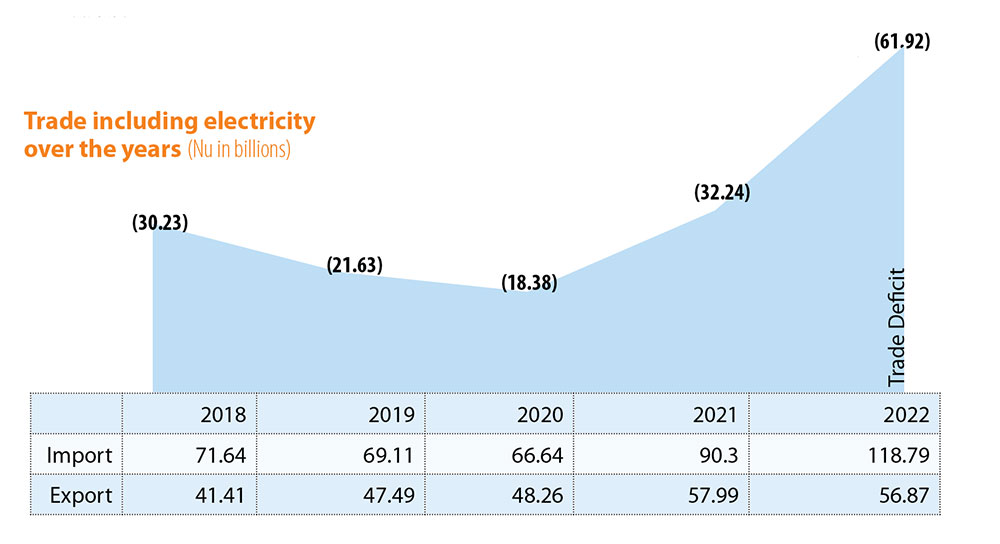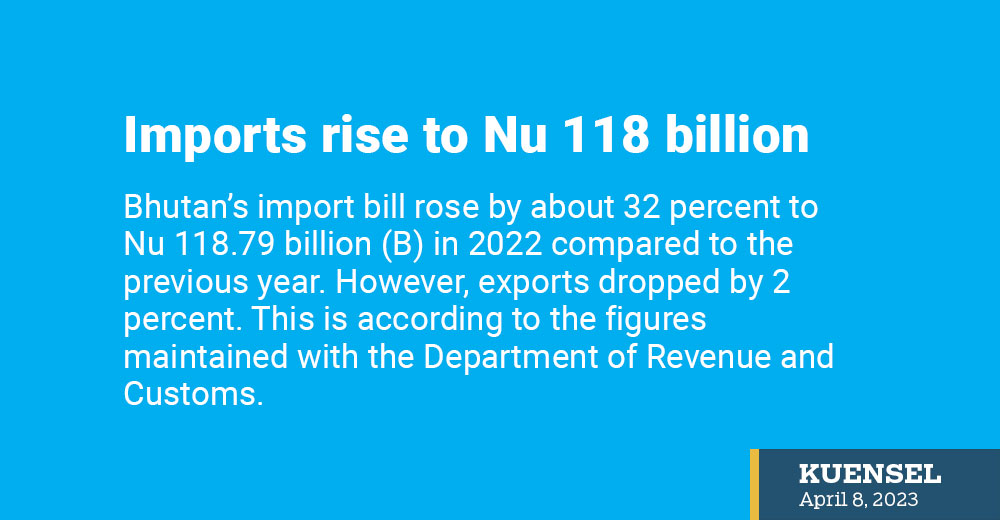… IT equipment tops import list
Thukten Zangpo
Bhutan’s import bill rose by about 32 percent to Nu 118.79 billion (B) in 2022 compared to the previous year. However, exports dropped by 2 percent.
This is according to the figures maintained with the Department of Revenue and Customs.
Both imports from India and other countries saw an increase. With more than 70 percent of goods imported from India, the import value was recorded at Nu 85.09B last year, an increase of Nu 13.86B.
Similarly, imports from other countries rose to Nu 33.7B in 2022, up by Nu 14.71B.
Rising imports with increases in fuel prices and steel and a drastic rise in imports of information technology (IT) equipment further widened the country’s trade deficit.

A country experiences a trade deficit when the value of imports exceeds the value of export.
Bhutan’s trade deficit widened to Nu 61.92B in 2022, nearly doubling compared to 2021 at Nu 32.24B.
Bhutan’s electricity sale still plays an important role in narrowing the country’s trade imbalance. If not for the electricity export to India, the trade deficit would have further widened to Nu 84.4B.
Bhutan exported 7,270.36 million units of electricity worth Nu 22.48B in 2022. Electricity sales saw a decline compared to previous years. The electricity export value was Nu 24.44B in 2021 and Nu 27.52B in 2020.
Excluding electricity export, the ferrosilicon topped the export at Nu 16.22B. The total exports stood at Nu 56.87B in 2022.
Going by the import figures, there has been an unusual increase in the import of information technology equipment, which topped the import lists. It saw a drastic increase to Nu 11.91B in 2022 from Nu 4.33B. It was an increase of 175 percent or by Nu 7.58B.
Bhutan also imported Nu 8.74B worth of diesel, Nu 2.64B of petrol, Nu 2.61B of rice, Nu 1.93B worth of smartphones, and Nu 1.47B worth of cigarettes in 2022.
With the unsustainable rate of increase in imports, inflationary pressure, and depreciation of Ngultrum against the USD, the country’s foreign reserve is expected to decline further.
Statistics show that the country’s foreign currency reserve position of USD 1.24B in November 2021 saw a decline of 37.5 percent to USD 773.2 million (M). It was able to meet the requirement of 13.9 months of the country’s essential imports.
According to the Asian Development Outlook April 2023, if the reserves continue to decline at the rate of 2 percent monthly in 2022, the reserves position will breach the constitutional mandate requiring to maintain 12 months of essential imports.
The revised essential import value of 2023 for the normal period is USD 603M and USD 464M under the critical period.
However, it added that higher hydropower output will sustain Bhutan’s export finances and with the expected cessation of import of information technology equipment by mid-2023, it is expected to keep the reserve position from deteriorating in the short-term.
It is critical for Bhutan’s economy to correct its trade imbalance by not only curtailing imports but also boosting exports with more foreign direct investments and external grants.


